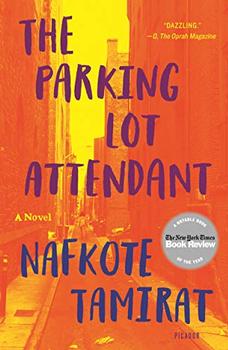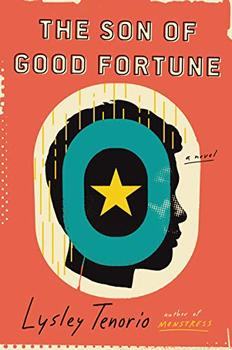Summary | Excerpt | Reading Guide | Reviews | Beyond the book | Read-Alikes | Genres & Themes | Author Bio

A Novel
by Nafkote TamiratIn The Parking Lot Attendant, the young, unnamed female narrator's coming-of-age is interrupted by her introduction to the titular character, a charismatic Ethiopian-American pseudo-revolutionary named Ayale. This man becomes a father figure, a mentor, and ultimately a harbinger of doom to the teenage heroine in a story where the mundane becomes mythical, and then the mythical turns tragic.
The author, Nafkote Tamirat, provides fascinating insight into the psychology of brainwashing, and how narcissistic predators with delusions of grandeur can wreak havoc on the young and vulnerable. Just like the protagonist, the reader is left wondering: Who is Ayale? How does a parking lot attendant cast a spell of admiration on all those who encounter him? He is revered as a virtual saint by Boston's close-knit community of Ethiopian immigrants, but what is truth and what is fiction? The narrator captures this community's awed bewilderment in a humorous catalog of facts that are both outlandish and banal at once: "We knew that he slept with many women...We knew that Ayale had a flair for interior design, picking women's shoes, and intuiting the weights of suitcases without using a bathroom scale like the rest of us...We knew that Ayale had achieved high levels of higher education, which was why he felt that he was a bit too good for everything around him, and we mostly all the time agreed with this."
When the novel begins, the young woman and her father are living on a mysterious island (also unnamed) as members of a cult. Most of the narrative is told in flashbacks, as the narrator describes a tumultuous childhood and her subsequent craving for adult approval and guidance that drew her to the seemingly kind parking lot attendant. This desperation prevents the young woman from seeing that Ayale is grooming her as a predator would, buying her nice things, giving her individual care and attention, trusting her with the delivery of secret packages. It is the latter aspect of the relationship that finally raises a red flag, and the narrator learns that Ayale has an outrageous plan to wage a revolution in a contested area between Somalia and Ethiopia and then establish himself as the new country's dictator. As members of Boston's Ethiopian community start turning up dead, the narrator realizes she has made a terrible mistake in aligning herself with Ayale. At the end of the novel, the narration returns to the present day where the young woman finds herself in grave danger.
Tamirat makes some salient points about identity—how young people pine restively for a sense of self, how immigrants often feel stuck between two cultures—and the human susceptibility to brainwashing, particularly during adolescence. The narrator's retrospective realizations about her relationship with Ayale are heartbreaking. Her declarations that "It wouldn't have occurred to me to be happy without him; I had nearly forgotten what that was like," and that sometimes "the best people are the worst for us to love" are painfully relatable (who among us hasn't been conned by love?).
The adults in her midst are just as bewitched. Running various illegal operations and scams out of the parking lot, Ayale is in the position to help out his friends with their debts, and in return they are his "disciples," "a human fleet in his own image." How far would they go for him? What terrible deeds are these people capable of? There is palpable tension.
The protagonist's relationship with her father is another great tragedy. He is not a bad man, and he is not intentionally withholding affection and intimacy from her. Though he left her when she was a child, he returned and tried his best to be a parent. He loves her and supports her the only way he knows how, but he is a solitary person and uncomfortable expressing his feelings. "He appreciated love," she explains, "he wanted to do right by others, but he also wanted to be left the f—k alone." The protagonist seeks paternal guidance from Ayale, all the while ignoring or flouting her real father's genuine concern and attempted intervention in this inappropriate relationship. When she finally realizes the extent of her mistake, it is too late to make amends.
Though the narrative is rather bleak, The Parking Lot Attendant contains surprising moments of comedy, thanks to the whip-smart and charming narrator, and her capacity for loving someone (even though he is the book's villain) is touching. If the novel has a flaw, it is that the present-day sections of the story are somewhat ambiguous. This is by design as the narrator is not fully aware of what is happening, and consequently cannot relate it accurately to the reader. Her fate at the end of the novel is left open to interpretation. Ultimately, however, leaving the reader wishing to know more is not such a terrible offense, and can easily be interpreted as a testament to the book's compelling plot and characters.
![]() This review was originally published in The BookBrowse Review in March 2018, and has been updated for the
September 2019 edition.
Click here to go to this issue.
This review was originally published in The BookBrowse Review in March 2018, and has been updated for the
September 2019 edition.
Click here to go to this issue.

If you liked The Parking Lot Attendant, try these:

by Hildur Knútsdóttir
Published 2025
Hildur Knútsdóttir's The Night Guest is an eerie and ensnaring story set in contemporary Reykjavík that's sure to keep you awake at night.

by Lysley Tenorio
Published 2021
From award-winning author Lysley Tenorio, comes a big hearted debut novel following an undocumented Filipino son as he navigates his relationship with his mother, an uncertain future, and the place he calls home.
Your guide toexceptional books
BookBrowse seeks out and recommends the best in contemporary fiction and nonfiction—books that not only engage and entertain but also deepen our understanding of ourselves and the world around us.